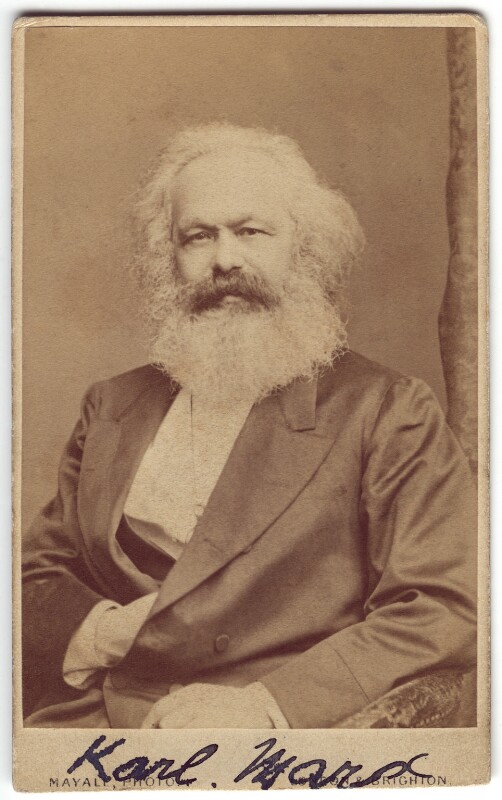Liberty Matters
The False Accusations made against the Free Market by Socialists

Marx was only one of many critics of the free market who emerged in the 1840s, especially in France where he lived in 1843-44 (when he was writing his Economic and Philosophic Manuscripts) and again in 1848 (when he presented his recently completed Communist Manifesto to the German Communist League in Paris during the revolution).[27] Among these critics were Pierre Joseph Proudhon, Victor Considerant, and Louis Blanc,[28] whose ideas the French political economists like Charles Dunoyer, Michel Chevalier, and Frédéric Bastiat criticized in numerous articles and books. Marx's writings need to be seen in the context of this broader critique of the free market which was taking place at this time. In spite of Marx's harsh rejection of what he called French "utopian socialism," his critique of "capitalism" was similar to that of the others in spite of what he might say in polemical works like his attack on Proudhon's Système des contradictions économiques (1846).[29]
Two things particularly frustrated the French economists about this critique. Firstly, they agreed with many of the socialists' criticisms of the injustices of contemporary society concerning the vested interests who used the state for their own ends at the expense of ordinary working people. Gustave de Molinari even offered to form an alliance with the more-radical socialists groups in France in June 1848 (on the eve of the bloody June Days uprising) since he thought they all shared so many goals in common, in particular, what he called a shared vision of a "utopia of liberty."[30]
And secondly, and perhaps most importantly, the socialists blamed the free market and laissez-faire competition for causing these problems in the first place in spite of the fact that the liberal reform agenda had barely begun to be implemented.
Charles Dunoyer (1786–1862) expressed this concern best in a 60-page appendix he inserted at the end of volume three of his massive De la liberté du travail (1845).[31] The book was devoted to exploring how the principle of the complete liberty to work and produce had evolved historically and what it would mean for human prosperity when a society based upon this freedom had been brought into existence. Naturally, he found the objections of socialists like Considerant and Blanc to be wrong and misplaced.
Dunoyer summed up his objections in five points:[32]
- fully free markets did not exist anywhere, so it was false to blame economic problems on what did not yet exist;
- the socialists did not recognize the great advances which had already made in bringing people out of poverty, especially since the Revolution had destroyed so many of the restrictive practices of the Old Regime;
- the socialists had not identified the real causes for poverty: the persistence of restrictions on trade and production, the burden of taxes, and the never-ending problem of war and conscription (the so-called "blood tax" imposed on young men);
- the remedies proposed by the socialists would not work: namely "the organization of industry" and "the association of workers" into government-controlled "social workshops," based upon models drawn from the military and government bureaucracies or the hated "corporations" which controlled many professions in the Old Regime; and finally
- the real remedy for poverty was more of what the socialists rejected, namely, the creation of "un régime de plus en plus réel de liberté et de concurrence" (a regime of more and more real liberty of competition).
This problem still plagues classical liberals and defenders of the free market 170 years later. Until we can decisively refute these false accusations, we will just have to keep fighting the same intellectual battles again and again in a free-market version of the film Groundhog Day.
Endnotes
[27.] Gareth Stedman Jones, Karl Marx: Greatness and Illusion (Penguin Books, 2017), pp. 219–22.
[28.] See Louis Blanc, Organisation du travail. IVe édition. Considérablement augmentée, précédée d'une Introduction, et suivie d'un compte-rendu de la maison Leclaire. La première édition a parus en 1839 (Paris: Cauville frères, 1845); Victor Prosper Considérant, Théorie du droit de propriété et du droit au travail (1st ed. 1845; Paris: Librairie phalanstérienne, 1848. 3rd ed.); Pierre Joseph Proudhon, Qu'est-ce que la propriété? ou Recherches sur le principe du Droit et du Gouvernement. Premier mémoire (Paris: J.-F. Brocard, 1840); and Proudhon, Système des contradictions économiques, ou Philosophie de la misère, 2 Volumes (Paris: Guillaumin et cie, 1846).
[29.] Karl Marx, Misère de la philosophie: réponse à la philosophie de la misère de M. Proudhon (Paris: A. Frank , 1847).
[30.] Gustave de Molinari, "L'utopie de la liberté (lettre aux socialistes), par un Rêveur", JDE, T. 20 No. 82, 15 juin 1848, pp. 328–32.
[31.] Charles Dunoyer, De la liberté du travail (Paris: Guillaumin, 1845), vol. 1, Chap. X. Post-scriptum sur les objections qu'on a soulevées, dans ces derniers temps, contre le régime de la libre concurrence, pp. 408–71.
[32.] Dunoyer, De la liberté du travail, vol. 1, p. 413.
Copyright and Fair Use Statement
“Liberty Matters” is the copyright of Liberty Fund, Inc. This material is put on line to further the educational goals of Liberty Fund, Inc. These essays and responses may be quoted and otherwise used under “fair use” provisions for educational and academic purposes. To reprint these essays in course booklets requires the prior permission of Liberty Fund, Inc. Please contact oll@libertyfund.org if you have any questions.